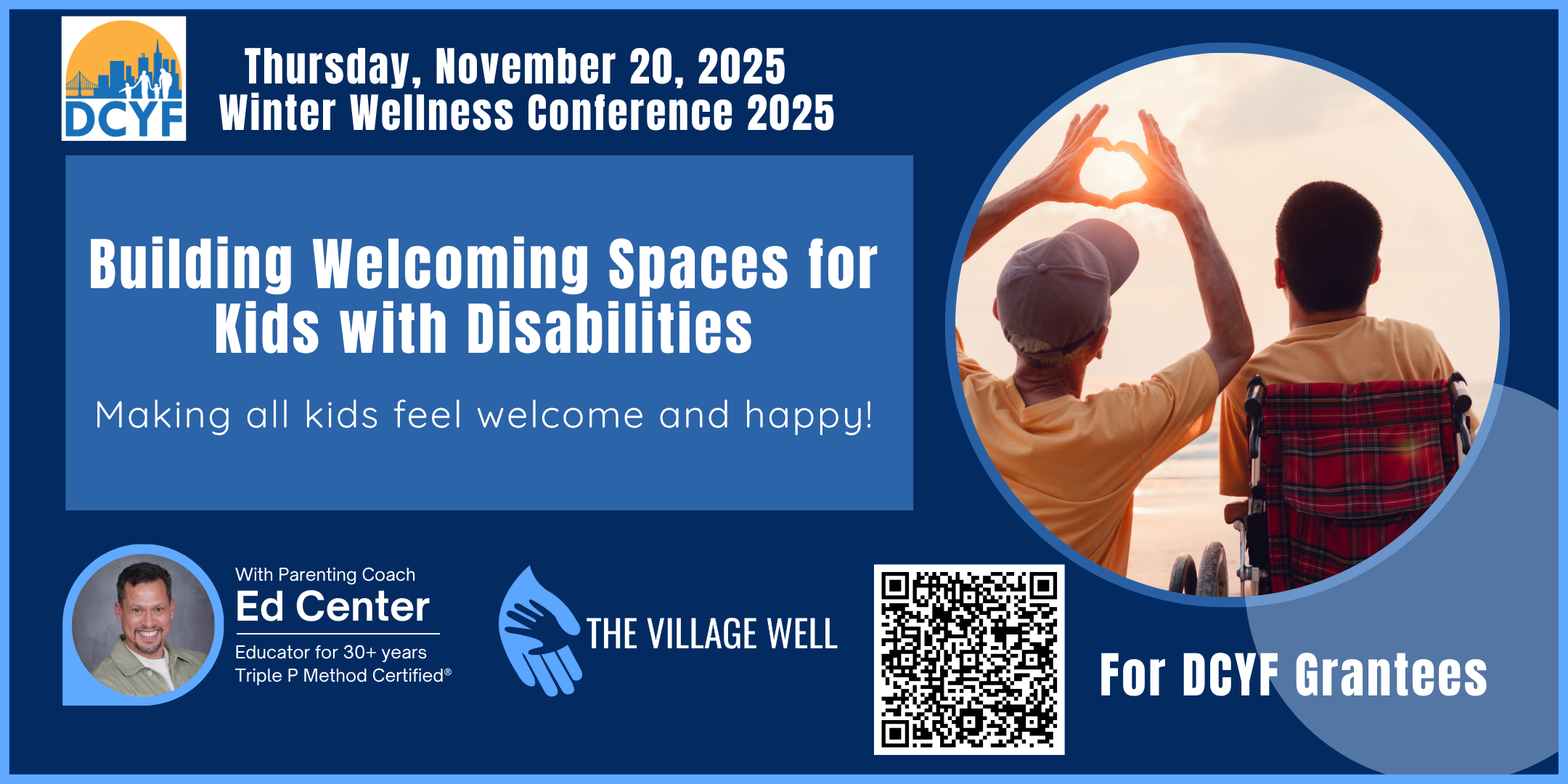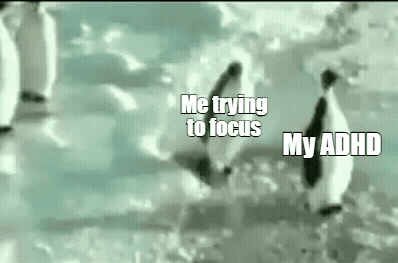The ADHD No One Saw Coming
announcements
Building Welcoming Spaces for Kids with Disabilities
Thursday, November 20, 2025
Hibernia Bank in San Francisco
Free | DCYF Grantees
Skill-Building Workshop: Building Welcoming Spaces for Kids with Disabilities
Elevate your programs! Join this essential, hands-on workshop at the DCYF Winter Wellness Conference on November 20.
Learn how to make your classes and activities safe and supportive for all youth, including those who are:
Physically disabled
Neurodivergent (ADHD, Autism)
Struggling with big emotions or trauma
What you'll get:
A framework to include everyone
Practice playing inclusive games (wear comfy shoes!)
Trauma-Informed tools for managing big feelings with kindness and clear boundaries
Come prepared to move, practice, and play your way to becoming a more inclusive leader!
The Mindful Resilience Series | Session 2
Tuesday, December 2, 2025 | 10 AM to 11:30 AM
Free | DCYF Grantees
Get ready to move and breathe! In this dynamic session, we dive into the powerful connection between your Mind and Body as a key to resilience. You'll learn how to leverage movement as a potent antidote to stress and trauma—for yourself and for the youth you serve. We'll explore practical ways to incorporate mindfulness that works, even for the most fidgety children (and adults!).
Skill You'll Gain: You'll leave with immediately usable, hands-on tools to integrate movement and mindfulness into your programming, helping you and your community stay grounded and centered.
the heart of the matter
This is the first of a three–part series about my journey getting diagnosed with ADHD at the age of 50, what I've learned about my brain, and how this has impacted my life and work. Part 1 is about my diagnosis and how inattentive ADHD works. Part 2 will explore the shame I carried and the masking I did to hide my “deficiencies”. Part 3 will explore how my diagnosis helped me understand my son.
Or maybe it won’t be that way. Afterall, I have ADHD. I may lose interest and go in a different direction. I’ve learned to work with my brain rather than fight against it. But before my brain takes the scenic route, let me at least try to start at the beginning.
Part 1: The ADHD No One Saw Coming
It never occurred to me that I could have ADHD. "Those kids" were way different than me - bouncing off the walls, losing their homework, and forgetting to raise their hand before blurting out something loud and hilarious.
Sure, I talked too much in class, but that was just extraversion. I was polite, got good grades, and was often the teacher’s pet. Adults looked at me and thought, “Ed? He’s fine.” Meanwhile, inside my head, things were… not fine.
My happiness was often ambushed by moments of emotional dysregulation. Huge tempers would hijack my brain. In an oft-told family tale, I was red-carded out of a soccer game when I was 11 - for yelling at my own teammates! In my defense, we had a strategy, and my team wasn’t following it. The story is funny to me now, but at the time, rage took over and I didn’t know how to stop it, even though the referee and my coach were both trying to get me to find calm.
In high school and college, academic stress could literally bring me to my knees. In the pressure of finals week, I would sit in the shower and cry. I would feel hopeless, alone, overpowered. 30 minutes later, I would drink a cup of coffee and keep pushing.
The Symptom I Never Saw Coming: Emotional Overwhelm
I was diagnosed with ADHD just three years ago at the age of 50. One of the most important things I discovered is that emotional overwhelm is a core symptom. No one ever told me that. Not a single teacher, counselor, or adult.
Why overwhelm?
Well, I’ve learned executive functioning skills, but they are hard and require more energy from me than for a neurotypical person.
I can focus on uninspiring tasks, but it’s harder and requires more energy.
Time management, remembering where I put my keys, turning off the stove, and converting pacific time to eastern time all require more concentration and energy for me. When I run out of energy during a high stress moment, BAM, overwhelm takes over and I go into freeze mode. Total shutdown. My lizard brain is screaming and my thinking brain is offline. Or, if I’m pushed too far, I snap at people I love. My system gets so flooded that any little thing spills over the edge.
For 50 years I thought this was a character flaw. I wondered why I failed to get projects across the finish line. An executive coach suggested I was prone to self-sabotage. I tried to mask this deficiency, but sometimes I couldn’t and then I just felt ashamed.
Invisible ADHD Is Still ADHD
Because I wasn’t hyperactive, no one noticed.
Because I got good grades, no one questioned.
Because I was respectful and rule abiding, no one asked how I was doing inside.
I’m not mad about this. I didn’t know. They didn’t know.
This is what happens to a lot of kids with inattentive ADHD. If you’re not causing trouble, people assume you don’t have any.
Meanwhile, the real work of managing your brain is happening behind the scenes. Sapping your energy.
The Tools That Finally Made Sense: RAN
With the diagnosis, I started working with a therapist and coach who specializes in ADHD. Carlo has helped me learn how my brain works. My brain’s circuit board has different wiring. I’m learning to code within that wiring. I recognize the signs of overwhelm, name it, and then stop and rest. Many folks with ADHD have a metaphorical storage room full of projects we started with enthusiasm and then never finished. For me, this includes learning to play the cello, writing a book on Asian barbecue, and founding a BIPOC small business owner support club that only met once. I used to be embarrassed about these “failures”. Now I reframe this as “prototyping”. I don’t have to carry all ideas to fruition. It’s okay to experiment and then follow-through on a few things that bring me joy. Right now those are running The Village Well and playing pickleball.
When I began learning how ADHD actually works, one of the most helpful frameworks I found was RAN — Rewards, Accountability, Novelty. RAN has been a productivity lifeline for me.
My brain thrives when these three things are present:
Rewards
I need a tiny dopamine treat to look forward to. This can be as simple as crossing off an item off a paper to do list, or saying I can go to the gym once I’ve finished a draft of this damn newsletter.
Accountability
The second someone else is involved—waiting on something, checking in on me, sitting near me—my brain suddenly wakes up. This is why my business partner Jennielyn and I schedule longer work meetings over Zoom. We don’t just talk about the work to do, we get the work done while we are meeting.
Novelty
We all get a greater dopamine hit when something feels new or interesting. This is why I thrive in the beginning of projects. But I can also create novelty in the mundane by working at a new cafe, or bringing in a new tool or technique into a parent coaching session.
RAN is a great productivity framework for everyone, but for me, it’s been career-changing.
Why This Matters for Our Kids
So many kids experience ADHD like I did: quietly, internally, invisibly.
We’re not “fine” just because we’re obedient.
We’re not “lazy” because we freeze.
We’re not “disrespectful” because we shut down.
If you have a kid who is too “sensitive”, “too emotional,” or “not trying hard enough,” they are probably not broken. They are likely overwhelmed. And that’s something we can ALL learn to support.
we’re obsessed with:
Sensitive Santa. Karla Chinen, our amazing guest at our Free Friday workshop last week, and founder of Empathy for Autism, is running the coolest event in the Inland Empire. Sensitive Santa is a holiday event for families of kids with autism, as well as any kids who thrive when the environment is predictable and subdued. It’s outside at a winery, so there are no echoes or artificial lights. There will be hot drinks from Starbucks and of course wine for the grown-ups. And if your kid needs some extra time to warm up to Santa? Nobody is bothered. If you are in the San Bernardino area check out the event here.
where we’ve been
Ed served as the moderator for the highly relevant session, "Coming up for Air: Mindfulness and Self-Care for the Caregiver," at the San Francisco Autism Society Conference 2025. Ed guided a powerful and meaningful discussion, focusing on the critical importance of personal well-being for those supporting loved ones in the autism community. The session was a vital reminder that caregivers must first take care of themselves. Learn more about the conference at the SF Autism Society website.
We had a wonderful time at Kai Ming in San Francisco, where we delivered our hugely popular workshop, "How to Stay Calm when Your Kid Is Not"! Parents and caregivers enjoyed a highly successful event filled with practical, effective strategies. Attendees learned valuable ways to manage their own stress and stay calm and collected, even during those challenging moments when kids are struggling. The goal was to provide tools that help families create a calmer, more connected home life. To make sure everyone felt comfortable and could participate fully, we were so happy to offer the entire workshop translated and delivered in Cantonese! This helped ensure the content was accessible and culturally relevant for our local San Francisco community.
Thank you to everyone who joined our recent workshop with Karla Chinen, founder of Empathy for Autism! Karla, who is on the spectrum and is raising a child with autism, shared practical and compassionate insights on what autism is, how it presents, and essential strategies for advocacy and support. Attendees—including parents, educators, and service providers—gained a deeper understanding of the spectrum and learned actionable steps for helping kids thrive with confidence. Explore Karla Chinen's work at Empathy for Autism!
Book a workshop for your school or organization.
Bring The Village Well to your school or organization. We provide powerful, interactive and fun workshops for parents and/or staff. Learn more.
Ed Center, the founder of The Village Well, is a parenting coach and educator certified in the Triple P method. The Village Well is a community of parents in BIPOC families, focused on attaining more joy, calm, and meaning in family life. We coach parents to prioritize their own healing and wellness, deepen connections with their kids, and learn tools to support better behavior. Services include Parenting workshops, Parenting courses, and community events. Our support is culturally-grounded support and honors your unique family. Ready to stop yelling? Schedule a free consultation with one of our team members.
FOLLOW THE VILLAGE WELL ON:









